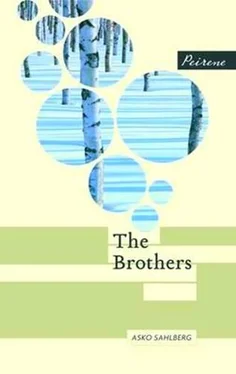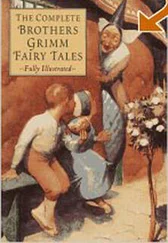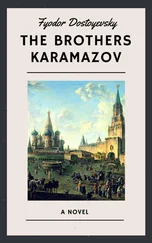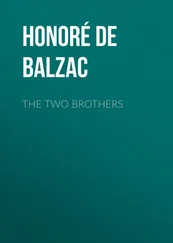‘What if he kills you?’ Anna asked, in a childishly tremulous voice. ‘Father said you ought to take his knife away. They say he’d be best off in the King’s army.’
Erik laughed, or at least he tried to. ‘Don’t worry. He’s not that mad. I’m his brother, after all, and he wouldn’t do such a thing to Mother.’
‘Still, I’m scared. Given he’s got a grudge against my family.’
‘Because of the horse? Yes, I expect so. But he hasn’t got a grudge against me about it.’
‘Father still feels so guilty he can’t sleep at nights. Now he would give away as many as three horses for free, so he says.’
‘Tell your father not to worry. Or I’ll tell him myself.’
Anna’s voice became fluttery with fear. ‘What if we were to go away?’
‘Ah, so we should run away, should we? Don’t. It’ll be all right, I’ll talk to Henrik. I don’t think he even wants to get married, really. It’s just tradition for the elder son to bring a daughter-in-law into the house. Henrik said once…’
I could hear their rabbit hearts beat with expectation. ‘What? What did he say?’
‘He said that we came into this world in the wrong order. That he’s not comfortable here and doesn’t want to remain here, that he wants to see the world. I need a wife, not Henrik.’
Their voices suddenly softened. Erik was probably already picturing himself blowing out the night candle.
‘And I a husband,’ said Anna. ‘We are sure to have a good life, aren’t we? Say that it is so, Erik.’
‘Of course we will.’
‘And children. Won’t we?’
‘A brood of such magnitude that we’ll have to extend the house.’
But they never had children. However, you hardly feel like lamenting their fate when you compare it to Henrik’s lot. Not many men are so assaulted by a foul wind that they are first robbed of a horse and then of a wife. And if the man has been cheated of the horse by his nearest neighbour and of the wife by his own brother, he can hardly be blamed for wanting to take his sorrows and his losses elsewhere.
First Henrik went to Vaasa. We did not hear from him for a long time. We got used to his absence. I believe each of us reminisced about him as briefly as possible. We let the memory come and then wiped it away. I thought of him as if he were a tree that had once stood in the yard, a tree that had swayed during storms, right by an outhouse, and had finally been felled. So I was surprised when one day a cart drawn by a healthy-looking mare appeared in the yard, with Henrik sitting on it. He was wearing good clothes, but was otherwise unchanged: stiff-backed, bone-faced, despising everyone and everything. The reason for his visit never became clear and he did not stay long. Early one morning, two or three days later, cart and mare were gone. He did not leave without a trace, however. For weeks afterwards, a mysterious, gloomy atmosphere drifted about the house and its surrounds, like the smell after a wake.
Later, we learnt in a roundabout way that he had moved to Turku. When he again appeared in the village, he was wearing gentleman’s clothing and driving a two-seater gig pulled by a muscular gelding. As if that were not enough of a shock, he was sharing his conveyance with a woman whose greatest, perhaps only, talent was occasionally to burst into screeching, ear-splitting laughter. I suppose I was not alone in feeling grateful to God when Henrik took the woman and her screeching away so quickly. That week, I gave more than usual to the Sunday collection.
I would no longer let myself be deceived by the passing of time. I was prepared when one day a splendid carriage appeared in the yard, drawn by two full-blooded stallions. A real Swedish mademoiselle stepped out. And I was not particularly surprised that this time there was a weary, vacant look in Henrik’s eyes. Time had clearly caught up with him. He had tried to stay ahead of it by rushing from one town to another, but though his simple cart had transformed into a carriage and screeching prostitutes had become bourgeois ladies from Stockholm, time had at last got the better of him and disclosed to him the permanence of his destiny, its inexorability: he was still the same man who had first been cheated of a horse and then of a woman.
After that, more than two years went by before we heard he was living in St Petersburg.
I should have guessed a war was coming.
A year later, it was here.
ANNA
They think I do not know. But what they do not know is that I can see in the dark, like an owl. At night, when time curls up in a ball, I see people and things as they really are. Then I open my mouth and my voice roars, silent but terrible.
Then I begin sweating and my hands are forced to console me.
Now the Old Mistress wants me to go to Turku with her. That means she wants me as far away as possible from Vaasa. Perhaps a mother’s duty is to cover up her sons’ deceptions, to protect and look after them. I doubt I would go that far for the sake of my own children, but a woman might change once she has borne life. I cannot know and probably I will never know. I am an object of pity as a result, but the more I think about the matter, the more it feels like a release.
I do not care what sort of woman Erik has in town. Let her be a bourgeois lady or a slum-dwelling washerwoman. Let her have ample breasts and the secret places that drive men mad. I sit here and think the woman out of existence. I take that faceless figure and crush it until the skin begins to split. Soon I will chop up that sinful flesh. I should be preparing a meal but there is still time. I stop time, it is a clock inside me, it is mine.
I hear sounds from outside. I stand up and go to the window. The cart stands in front of the stable. The old gelding is hanging its head, exhausted after the long journey. They are home.
ERIK
I do not want to look at the house. I thought I would be able to resolve the matter, but no. I let Mauri hold the reins and direct my gaze beyond the field, where no buildings are in sight. I am irked by my visit to the Crown Bailiff. A waste of time. Old Pig-Face was more interested in cleaning his pipe than in my calamity. Or maybe he is weighed down by worry, fearing that the Emperor will discontinue his office. Never mind. Now they may come any day, perhaps as early as today. I cannot look at the house.
We come into the yard and I look at the house. The southern wall is beginning to rot and the roof wants repairing. It is no longer my concern. In my folly I imagined that, according to some law of nature, a man cannot suffer bad luck time after time. I thought: you can set a trap in the woods and go and check it for weeks and weeks, and find nothing. Then finally one day you find in it your thrashing prey.
Maybe I should have had a number of traps instead of relying on one. But no need to dwell. Now I have to bear the consequences.
Although I do have the musket in the hayloft.
I jump off the cart and see the Farmhand coming round the stable corner. I do not wish to talk to him, him of all people. He is too sympathetic. I should be whipped. Open up my veins and let me drink my own blood! But the Farmhand gives his lopsided smile, as always, and says, ‘You made it to town, then.’
‘I had business there.’
‘Who’d go there otherwise?’ He does not stop smirking. I know from his face that something is wrong. ‘Though as things stand, I might leave for town even with no business to deal with.’
‘That so? What’s going on here, then?’
He spits sideways and begins eyeing the open field. ‘There’s nothing going on here, at least not yet. Or there is, but I don’t yet know what it is.’
‘Am I supposed to make something of that?’
Читать дальше












